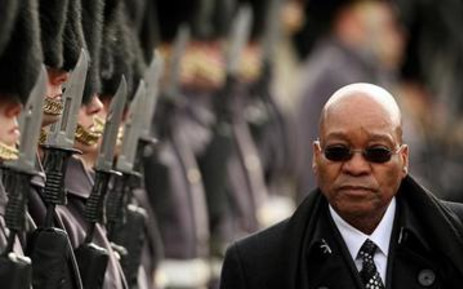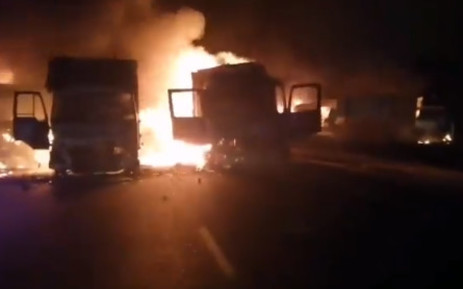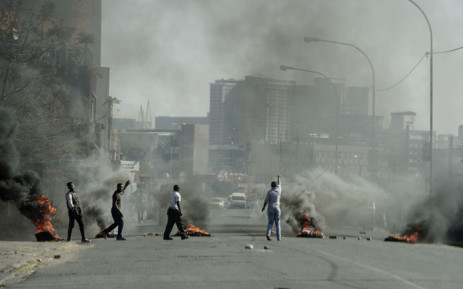FORMER PRESIDENT JACOB ZUMA IN DATES
He is the first president of democratic South Africa to be arrested, and the first president of South Africa ever to be jailed.

JOHANNESBURG, South Africa - Key dates for South Africa's former President Jacob Zuma, who has been slapped with a 15-month jail term after snubbing the state capture commission of inquiry and said on Wednesday he would hand himself in to start serving his sentence.
April 12, 1942: Zuma is born in rural Nkandla in KwaZulu-Natal province. He grows up without formal schooling.
1963: A member of the armed wing of the ANC, he is convicted of trying to overthrow the apartheid government and serves 10 years in the Robben Island prison alongside Nelson Mandela.
1973: Freed, he sets up underground ANC networks and then works from Zambia as the group's chief of intelligence.
1990: After 15 years mostly spent in exile, he returns to South Africa when the ANC is unbanned. He is key in talks that lead to a national unity government after the first all-race elections, in 1994, won by the ANC.
1997: He becomes the ANC's vice president. Two years later he is elected deputy president of the country.
2006: He is cleared of rape charges but ridiculed for testifying he took a shower after consensual sex with his HIV-positive accuser.
2009: Two years after ousting Thabo Mbeki as ANC leader, he is elected president. He is re-elected in 2014.
2016: A top court finds he flouted the constitution by using public funds to upgrade his private residence. An anti-corruption watchdog meanwhile charges he allowed a wealthy Indian business family, the Guptas, undue influence over his government.
2017: Zuma fires his finance minister, unleashing open war in the ANC.
August, 2017: He survives his fourth impeachment vote since 2015.
December, 2017: He is replaced as ANC chief by his deputy, Cyril Ramaphosa, and comes under pressure to quit the presidency early, ahead of the next elections.
February 14, 2018: Resigns from the presidency after the ANC threatens a no-confidence vote in parliament.
May 2021: Trial begins in his graft case dating back more than two decades and involving French arms firm Thales.
June 2021: Gets a 15-month jail term for contempt of court following his refusal to appear before anti-graft investigators. He files appeals to avoid a possible arrest.
https://ewn.co.za/2021/07/08/former-president-jacob-zuma-in-dates?utm_source=dlvr.it&utm_medium=twitter
AS COST OF DAMAGES RISES TO R100MN, KZN TOP BRASS TO MONITOR PRO-ZUMA PROTESTS
The unrest, which has been linked to the imprisonment of former President Jacob Zuma, has been brewing for over a week now, with 37 trucks torched so far in various parts of the province.

JOHANNESBURG - The KwaZulu-Natal provincial government has deployed its top brass to assess and monitor violent protests as the cost of damage rises to an estimated R100 million.
The unrest, which has been linked to the imprisonment of former President Jacob Zuma, has been brewing for over a week now, with 37 trucks torched so far in various parts of the province.
The KwaZulu-Natal government said 37 people had been arrested and face charges including malicious damage to property, public violence and business burglary.
KwaZulu-Natal Premier Sihle Zikalala said he and the provincial council had instructed the MECs for transport, community safety, economic development and tourism to visit the Mooiriver area following the violent protests which saw people block highways and set trucks alight.
The council has confirmed there were illegal activities such as the closure of main roads, the looting of businesses and damage to private and public property in various areas across KwaZulu-Natal.
Having placed a R100 million price tag on the damage caused, the officials are worried the disruptions will likely have a deeper impact on the economy, with a domino effect extending to other parts of the country.
The provincial government said it had requested extra resources from the national joint crime prevention and security cluster.
Authorities have adopted what they described as a “multi-pronged” response plan that included engagements with affected communities and maintaining high police visibility in areas identified as hotspots.
https://ewn.co.za/2021/07/11/as-cost-of-damages-rises-to-r100mn-kzn-top-brass-to-monitor-pro-zuma-protests
JEPPESTOWN A NO-GO ZONE AFTER PRO-ZUMA PROTESTS IN JHB
Protesters were on the streets putting up barricades, with some wielding sticks, knobkerries and sjamboks.

JOHANNESBURG - Most roads leading in and out of Jeppestown have been closed by protesters believed to be supporters of former President Jacob Zuma.
For days demonstrators in KwaZulu-Natal and Gauteng have been demanding the former president be released from prison.
He was handed a 15-month jail term for not adhering to a Constitutional Court ruling ordering him to comply with the state capture inquiry.
Large parts of Jeppestown in downtown Johannesburg are now no-go areas, with protesters all over the streets putting up barricades and some wielding sticks, knobkerries and sjamboks.
Motorists have been battling to make their way in and out of the area.
Police have arrested at least seven people, with four caught inside one of the stores that was looted and the others taken in for public violence.
“The SAPS in Gauteng, working closely with their respective local municipal departments, have heightened visibility and remain on high alert in response to instances of opportunistic criminality and violent protest,” said the police’s Brenda Morilidi.
In Alexandra - where shops were looted and one was set alight - police have arrested 18 people for public violence and a police officer was shot.
Two other officers sustained minor injuries.
At around 3pm, the situation was calm with police monitoring the situation.
However, motorists were advised to avoid parts of Johannesburg this afternoon as a result of the violence, including the CBD.
Protestors also blockaded parts of the N1 near Sebokeng and looted shops in the area.
“Protesters are looting shops and bottle stores and are causing major obstruction on the roads of Lillian Ngoyi, Marshall Street, Commissioner Street, Rahima Moosa Street and all the cross streets.
"The N1 North and South is also blocked at the R28 near Sebokeng offramp. Motorists should use alternative routes as there are rocks and boulders on the N1 freeway,” said the JMPD's Wayne Minnaar.
IMPACT ON POWER SUPPLY & TRANSPORT
City Power has had to stop services on Sunday as a result of the violent protests.
The power supplier said the ongoing violence had forced it to withdraw teams from areas such as Alexandra, Malvern, Jeppestown, George Goch and parts of the CBD.
City Power’s Isaac Mangena said they were monitoring other hotspots across the city and apologised to affected residents.
As a result of the violence, the Rea Vaya bus service in Johannesburg has also stopped operating on Sunday, while the Gautrain announced that Park Station had been closed and there would no service between Park Station and Rosebank until further notice.
Meanwhile, Parliament spokesperson Moloto Mothapo said peaceful protests were a constitutional right, but violence, criminality and incitement were an affront to our constitutional democracy.
https://ewn.co.za/2021/07/11/as-cost-of-damages-rises-to-r100mn-kzn-top-brass-to-monitor-pro-zuma-protests

No comments:
Post a Comment